
When the military junta took over the government, Gen Prayut Chan-o-cha proclaimed to loud cheers an age of reform.
Henceforth, there'd be no more bad politicians, no more bad officials, no more disharmonious squabbles and no more corruption. Hallelujah!
Only good people would have a rightful place in society. No more division of red and yellow, only good and bad. Needless to say, those who followed the junta's lead are good.
The bad people either have to have their attitudes adjusted or, in the worse case, be put away in jail where they would not be able to spoil the rest of us.
The problem is, in more than a few occasions, supposedly good people in government do something that calls into question their definition of goodness.
Just a couple weeks ago, Gen Anupong Paojinda, one of the five "Bigs" in the National Council for Peace and Order (NCPO) and also the interior minister, was reported to have signed off an order to acquire a lot of speed guns at a greatly inflated price.
Media reports probably also reminded you that this same official was also responsible for the acquisition of the useless GT200 bomb detectors and the equally useless surveillance airship during his time as army chief.
In both cases, he survived public calls for his accountability by playing deaf, with help from two "independent" anti-corruption organisations, which found the deals above board.
Not allowing his colleague to hog the limelight, this week the government's legal guru, Meechai Ruchupan, attracted media attention when it emerged that one of his close aides for the past three years was none other than his daughter.
Her position as deputy secretary-general carries an official monthly salary of 47,500 baht.
Caught with his pants down, figuratively speaking, Mr Meechai resorted to the usual obfuscation, saying his work often dealt with confidential state information which necessitated the need for trustworthy staffers.
If it were somebody else speaking, his explanation could be laughed off as merely being lame excuses. However, this is someone who a decade ago insisted that politicians not engage in nepotism at the expense of the taxpayer. So it came off not so much as a lame excuse but hypocrisy.
But Mr Meechai and Gen Anupong are not alone in the department of unethical conduct. Many officials appointed by the junta have been caught in similar predicaments.
Prominent among them was Gen Prayut's own brother, Gen Preecha, who had been involved in several unsavoury scandals and survived almost unscathed.
Appointed by his brother as a member of the National Legislative Assembly, Gen Preecha attended a total of six (yes, six) out of 453 meetings during two legislative sessions in 2016.
His excuse? He was too tied up with official duties as permanent secretary of defence.
Gen Preecha's young son, just out of college, was admitted into the army with a rank of second lieutenant. He has just resigned from the service.
His older son owns a company that won seven construction contracts worth 155 million baht from the 3rd Army Area under the general's command. The company listed as its office Gen Preecha's official residence in an army barracks.
The list of appointed members committing similar improprieties is long.
And these are the stories that have come to light. For all we know, they could be just the tip of the iceberg.
Is it a hopeless cause to expect people in positions of power to adhere to a code of ethics? There's not much good news on the horizon, I'm afraid.
We are fighting an entrenched way of life. Thai people have been taught from a young age to look to officialdom as a domain that can provide them with positions of power or at least patronage, not to mention various ways of earning extra income.
Once in a position of power, one expects to have privileges including immunity against loss of employment or, in some cases, legal complications. With such an attitude, one has an incentive to mine one's position for whatever one can reap. Thereby, the culture of corruption has its patronage.
It is extremely difficult for Thais to shake off this mentality. Many people in power -- even relatively lower-ranking ones -- have provided plenty of examples that they can commit malfeasance and get away with it.
It's not hard to imagine that the common folk take it as the social norm whereby abuses of power are not only tolerated but rewarded.
So, no, I suppose in the short and medium terms we have little hope of turning around our culture of corruption.
Definitely no hope from the top-ranking levels where illicit rewards are greatest. Nor from the lower officials who must do their superiors' bidding.
So it boils down to civil society who must keep hammering home the importance of eliminating graft and exposing corrupt practices where possible.
We can only hope that in time enough people would overcome their apathy and fear to form a movement strong enough to tear down this national shame and social scourge.
Wasant Techawongtham is former news editor, Bangkok Post.
